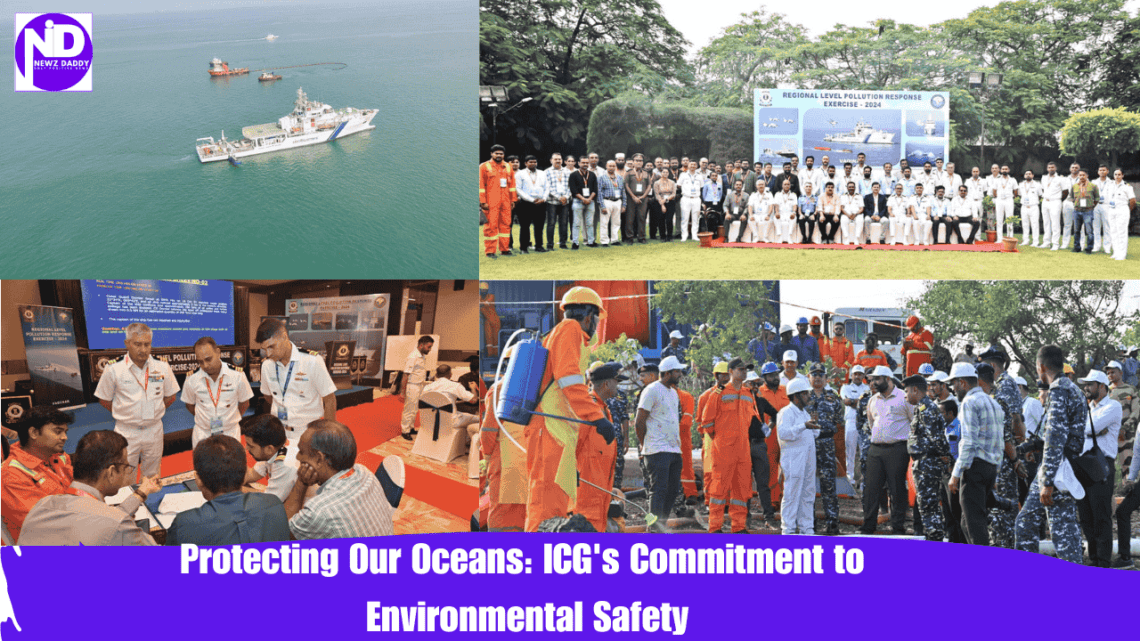Protecting Our Oceans: ICG’s Commitment to Environmental Safety
Newzdaddy Daily News Updates
Synopsis of the Article
- Regional Pollution Response Exercise: The Indian Coast Guard (ICG) conducted a three-day pollution response exercise in Vadinar.
- Objective: The exercise aimed to enhance preparedness and coordination among stakeholders for marine pollution response.
- Activities: The exercise included brainstorming sessions, tabletop exercises, shoreline clean-up, and a live pollution response demonstration.
- Participants: Representatives from various oil-handling agencies, state administration, and response organizations participated.
- Focus: The exercise focused on strategic and tactical response to potential oil spills, emphasizing real-time collaboration, resource mobilization, and use of advanced equipment.
- Inter-Agency Synergy: The involvement of key maritime industries reinforced ICG’s efforts to enhance inter-agency synergy.
- Commitment to Marine Environment: The exercise is part of ICG’s commitment to safeguarding the marine environment and ensuring the sustainability of India’s coastal and maritime resources.
Indian Coast Guard Conducts Regional Pollution Response Exercise
In Vadinar, the Indian Coast Guard (ICG) held a three-day regional pollution response exercise to show how committed it is to safeguarding the country’s maritime environment. Key stakeholders came together for the October 14–16, 2024, exercise to improve their cooperation and readiness for responding to incidents involving maritime pollution.
The exercise was a multifaceted event that featured a range of tasks intended to mimic actual situations. Participants held brainstorming sessions to talk about possible risks and create practical countermeasures. Tabletop exercises gave participants a practical chance to hone their coordination and decision-making skills in a safe setting.
A Focus on Shoreline Clean-Up and Live Demonstration
A coastline clean-up effort was one of the exercise’s highlights. To show their dedication to environmental preservation, participants cooperated to clear trash and pollution from the shoreline.
Furthermore, a live demonstration of the pollution response took place in the Gulf of Kutch. Through this simulation, the ICG’s operational readiness and incident management skills for oil spills and other marine pollution incidents were demonstrated. Specialized tools and workers were dispatched to contain and clean up the fictitious pollution as part of the demonstration.
Collaboration and Coordination
Representatives from a range of organisations participated in the simulation, including reaction groups, state government, and oil-handling agencies. To guarantee a well-organized and efficient reaction to occurrences involving marine contamination, this cooperation was crucial.
Throughout the simulation, it was clear that the ICG was focused on providing a tactical as well as strategic response to oil spills. Along with discussing short-term measures to contain and clean up spills, participants also talked about long-term planning and resource allocation. The ICG and its partners’ capacities were further augmented by the utilization of cutting-edge pollution response apparatus.
Protecting India’s Marine Environment
The Indian Coast Guard is essential to the preservation of the country’s maritime ecosystem. Through frequent training sessions and exercises, the ICG makes sure that its staff members are equipped to handle any occurrences involving marine pollution.
The Vadinar exercise demonstrates the ICG’s dedication to safeguarding India’s marine and coastal resources. For future generations, the ICG is contributing to a cleaner and healthier maritime environment by improving stakeholder cooperation and readiness.
Must Read:
12 crew members are saved by the Indian Coast Guard from a sinking ship off the coast of Vadinar.
The Nighttime Mission of the Coast Guard: Saving “Padmawati” from the Storm




